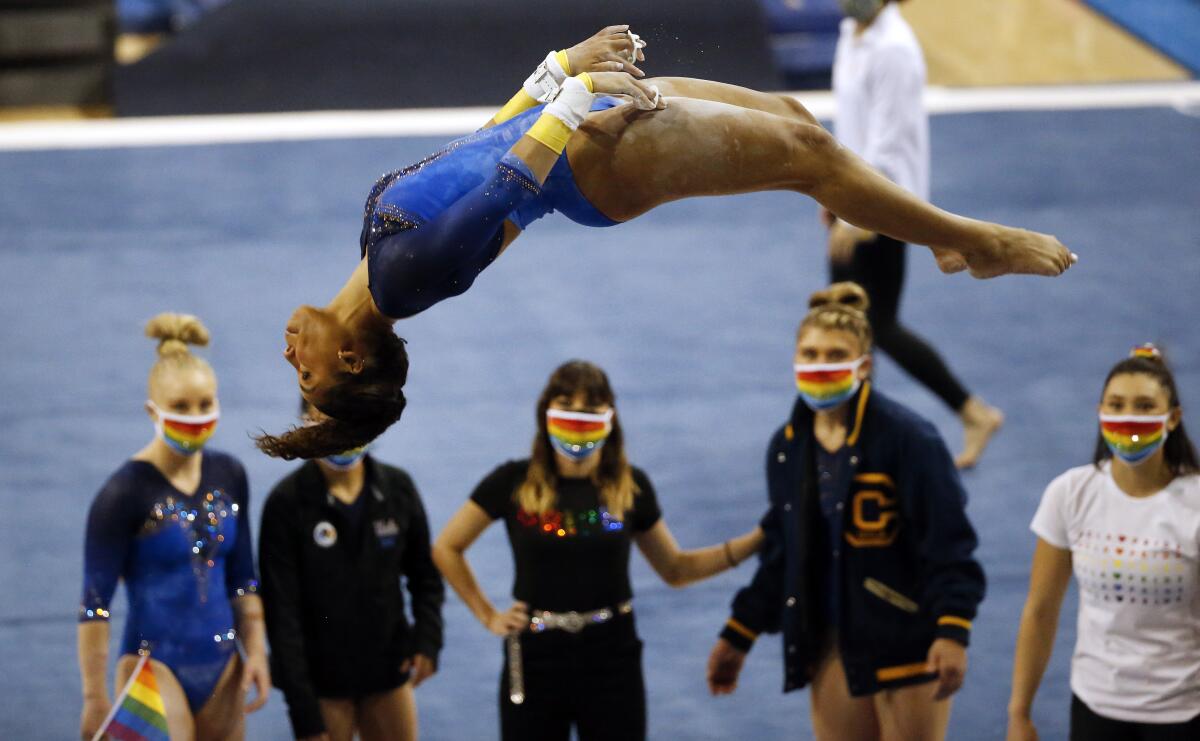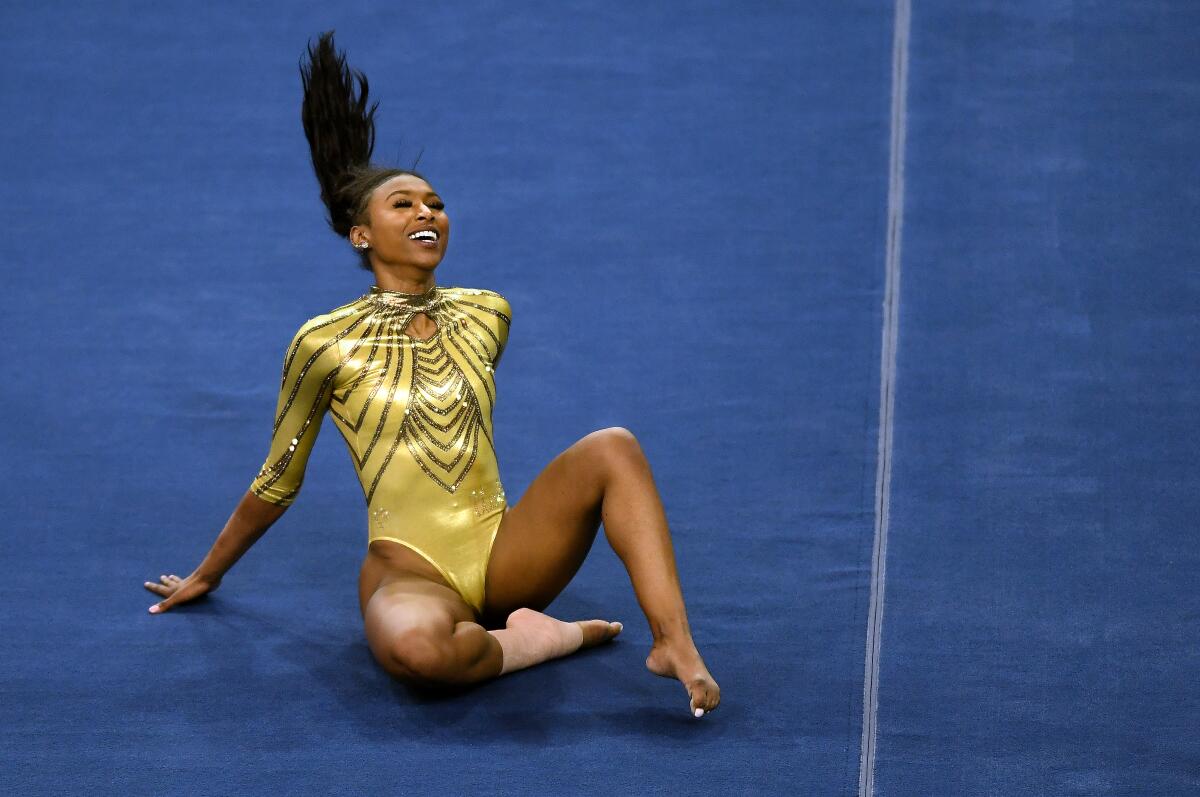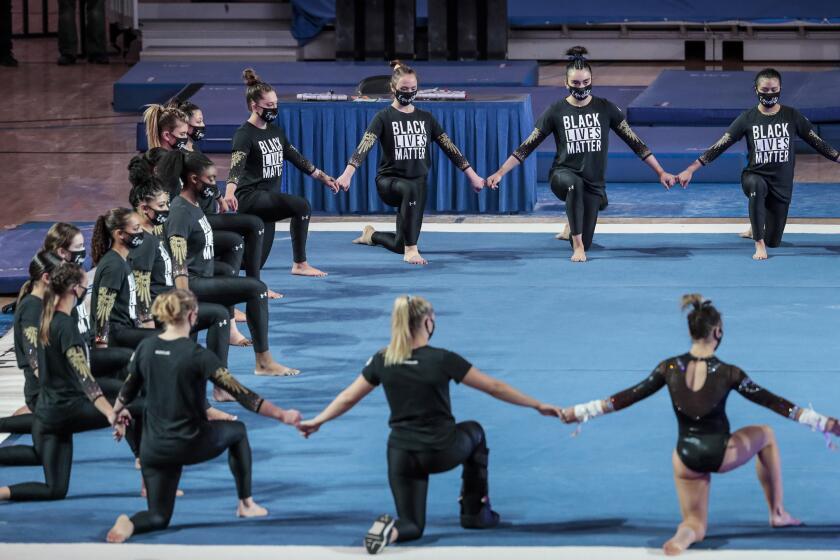Black gymnasts, including UCLA’s biggest stars, grapple with sport’s racism

- Share via
For years, UCLA gymnasts have tumbled across our screens. In viral videos of their floor routines, the team’s melanated gymnasts flip and dance to the music of Beyoncé, Janet Jackson or Rihanna as their teammates in the background do their choreography and the packed crowds in Pauley Pavilion cheer thunderously. UCLA’s program has been praised for embracing Black athletes and music in a sport that has often appeared to be overwhelmingly white.
The routines painted a picture of a space that seemed to be in such contradiction to elite gymnastics, the more traditional (and for many, the more boring) version we all watch every four years at the Olympics. Through the lens of UCLA gymnastics, the college version looked like a place of camaraderie, jubilant expression and freedom.
But in January, we were all reminded that UCLA gymnastics is still a part of a sport with a long history of exclusivity. News broke that since the fall, the team had been dealing with the fallout from Alexis Jeffrey, a gymnast who is not Black, reportedly singing lyrics that included the N-word. When her teammates approached her about it, she denied any wrongdoing and refused to apologize. Earlier this year, Jeffrey transferred to Louisiana State. But the gymnasts remaining at UCLA were unhappy with how the team and the athletic administration handled everything, including that coaches told the gymnasts to be tolerant of Jeffrey because they feared for Jeffrey’s mental health and told some Black gymnasts that Jeffrey was “scared” or “intimidated” by them. Margzetta Frazier told the Los Angeles Times the administration’s response was “abstract conversations that didn’t specifically address racism on the team” and that “her requests for help ... ‘were neglected and brushed under the rug.’” The cost of all of this was obvious at times in the gymnastics itself, especially at their season opener in January, when the team score was the lowest in seven years.
A UCLA gymnast was accused of repeatedly singing a racial slur. Her teammates were later accused of bullying her and forcing her out. Now the Bruins are working to recover.
As news about Jeffrey and how the school responded was emerging, the UCLA gymnastics program amplified their Black Lives Matter meet with images of gymnasts wearing shirts with the Rev. Martin Luther King Jr.’s famous “injustice anywhere is a threat to justice everywhere” quote. The sharp contrast between the school’s internal handling of racism and the team’s external proclamations of antiracism were glaring.
It felt surprising because of the reputation UCLA had built over the last few years, but it shouldn’t have been. UCLA is not even the only college program to have faced reports of racism from Black gymnasts recently. In the summer of 2020, Black gymnasts from Alabama, Florida and Nebraska all revealed the racism they faced on their collegiate teams. It turns out college gymnastics is still a lot like its elite counterpart, a sport still coached and managed by predominantly white staffs.
None of this is new. This is always what has made it a hard sport to exist in as a Black girl.
Gymnastics has a long, fraught history when it comes to racism. We know this well because for the last year, we have been tracing the history of Black girls in U.S. gymnastics in order to tell the story of how they have gone from the margins of the sport to its core. For our new podcast, “American Prodigies,” we talked to gymnasts, judges, coaches and choreographers about the ways in which Black girls’ bodies are judged more harshly, their hair scrutinized, their music choices critiqued and their experiences discounted.

We have an episode on UCLA gymnastics that we’ve been working on for months, long before this news broke. In it, we probe the genesis of these viral routines. What we learned is that these viral moments reveal less about college gymnastics itself and more about the ways in which these Black gymnasts have used college gymnastics to carve out a space for themselves in a sport that often requires them to check their culture at the door.
The sport of gymnastics is nothing without its expectations and exactitudes that are policed so heavily at every level of the sport, but especially so at the elite one. So much of the sports aesthetic historically has been white. As Rebecca Schuman wrote at Slate, “women’s gymnastics was, until fairly recently, a space almost exclusively dominated by whiteness. White athletes were considered the standard. Floor music came in two varieties: classical and elevator.” College gymnastics, spearheaded by UCLA, emerged as a counter to the stuffiness — the whiteness — of elite gymnastics. It was, instead, a place that emphasized team unity, showmanship and creativity. It was a door left ajar in the sport, one that these gymnasts could walk through and they did.
Sophina DeJesus created her 2016 routine, one of the earliest to go viral, with her mom, Maria, at their home. When she performed it, with her curly ponytail bright blue, she told us “it was like an out-of-body experience, like my Olympic moment.”
Hallie Mossett had her viral moment in 2017, when her routine started with her lying flat on the floor, one leg behind her head, a fist up in the air. The first beats of Beyoncé’s “Formation” set the tone. Mossett told us, “I felt like, me being very L.A. and being very proud of my Blackness, I wanted to bring all of that into the choreography and the routines that I did.” In fact, Mossett probably choreographed one of your favorite routines. She told us she choreographed close to 20 in her five years at UCLA. Her favorite part was working with the gymnasts and asking them, “Do you like this? Hey, tell me if you don’t like this move. If this makes you feel uncomfortable, we’ll change it.” She remembers that their eyes would light up when she’d ask. “It fills me with a little bit of joy,” she said. “Knowing that they have choices and that their voice matters. So many gymnasts’ voices did not.”
Nia Dennis had two viral routines, her first in 2020 and another in 2021. The former routine was inspired by Beyoncé’s “Homecoming” performance at Coachella and incorporated her dad’s love of stepping. While watching the latter and talking to us about that experience, Dennis said, “Black culture in gymnastics is not common. It’s not really recognized. And that’s what I wanted to do [with that routine].”
As these routines became more common, people have pointed out that UCLA participated in the commodification of these routines, of the Blackness of them. In fact, the embrace of Black gymnasts often seems conditioned on the ability to commodify and capitalize on their labor and their Blackness. UCLA’s recent reckoning around race and racism in their program reminds us of this fact. The seeming contradiction between the diversity in the program and the recent revelations is not one at all because the appearance of Blackness on the surface rarely, if ever, indicates systemic change underneath. It does not require a regime change.
UCLA gymnast Nia Dennis is a viral sensation, with a floor routine that tells a deeply personal story: “I know who I am as a woman and a Black woman at that.”
But make no mistake, these athletes are not naïve. Black gymnasts remain resolute in their desire to bring their whole self into the sport they love. When Sekai Wright rocks her Afro while she tumbles across the floor at Pauley, she’s continuing a long line of Black gymnasts at UCLA and beyond who continue to push boundaries of their sport and compel gymnastics, one floor routine at a time, into the future where all gymnasts can find freedom in the air.
Or perhaps Angie Denkins, the 1986 U.S. balance beam champion, said it best when we spoke to her: “It’s just a wonderful feeling for me to see more sisters and young ladies of different cultures that are up there and are really doing the doggone thing. … Embrace it. It’s inevitable. We damn good. So move over. Go sit down and enjoy the show.”
Amira Rose Davis is an assistant professor of history and African American studies at Penn State University and Jessica Luther is an investigative journalist. They are the showrunner and producer of the new season of “American Prodigies.” Davis and Luther are both based in Austin, Texas.
More to Read
Go beyond the scoreboard
Get the latest on L.A.'s teams in the daily Sports Report newsletter.
You may occasionally receive promotional content from the Los Angeles Times.








